The government of the Republic of Azerbaijan is organized at the base of principles of separation of power. According to the traditional concept of the separation of power, the Constitution determines that the President of the Republic of Azerbaijan holds the executive power, the legislative power is carried out by the Parliament of the Republic of Azerbaijan — Milli Majlis of the Republic of Azerbaijan and the judicial power is held by the independent courts.
The legislative power of the Republic of Azerbaijan is held by the Milli Majlis of the Republic of Azerbaijan.
The Milli Majlis of the Republic of Azerbaijan has 125 deputies.
The deputies of Milli Majlis of the Republic of Azerbaijan are elected on basis of a majority system, and general, equal, and direct elections by free, private, and secret ballots.
Each convocation of the Milli Majlis of the Republic of Azerbaijan is elected on the first Sunday of November every five years.
The terms of parliamentary deputies of the Milli Majlis of the Republic of Azerbaijan are limited by the terms of the convocation of the Milli Majlis of the Republic of Azerbaijan.
Every citizen of the Azerbaijan Republic who has reached the age of 18 can be elected a Deputy — Member of the Milli Majlis of the Azerbaijan Republic in the order determined by the Law. Persons who have dual citizenship, are in State service in other countries, work in Executive or Judicial bodies, Persons engaged in a different paid activity with the exception of scientific, creative and teaching work, ministers of religion, Persons whose inactivity has been confirmed by the court, Persons who serve their sentence in places of confinement by the court’s verdict cannot be elected Deputies.
The head of Azerbaijan State is the President of the Republic of Azerbaijan.
The President of the Republic of Azerbaijan holds the executive power of the Republic of Azerbaijan.
The President of the Republic of Azerbaijan is elected for a term of 5 years by general, equal, and direct elections by free, private, and secret ballots. A free, individual, and secret ballot shall elect the President of the Azerbaijan Republic for the term of 5 years via universal, direct, and equal elections. The President of the Azerbaijan Republic shall be elected by a majority of two-thirds of voters participating in the voting.
The President of the Republic of Azerbaijan is a Supreme Commander-in-Chief of the armed forces of the Republic of Azerbaijan.
The President forms the President Administration and appoints the head of the President Administration for the purposes of establishment of the necessary conditions for the implementation of the Constitutional authorities.
The President of the Republic of Azerbaijan administers the executive power.
The Administrative Department of the President is involved in logistical and financial support of the President and the President Administration.
The President of the Republic of Azerbaijan forms the Cabinet of ministers for the purpose of organizing the realization of the executive authorities. A cabinet of ministers is a superior body of the Executive power of the President, it submits to the President and is accountable before him.
Every Person no younger than 35 years old, permanently residing in the territory of the Azerbaijan Republic for more than 10 years, having election right, a University Degree, who has never been tried for a major crime, who has no commitments towards other States, exclusively a citizen of the Azerbaijan Republic shall have the right to be elected President of the Azerbaijan Republic.
There are Ministry of Agriculture, Ministry of Finance, Ministry of Labor and Social Insurance, Ministry of Ecology and National Resources, Ministry of Youth and Sports, Ministry of Economy, Ministry the Culture and Tourism, the State Security Service of the Republic of Azerbaijan, Ministry of Transport, Ministry of Communication and Informational Technology, Ministry of Industry and Energy, Ministry of Education, Ministry of Taxes, Ministry of Foreign Affairs, Ministry of Internal Affairs, Ministry of Health, Ministry of Justice, Ministry of National Defense of Azerbaijan Republic, Ministry of Defense Industry.
There is the State Customs Committee of the Azerbaijan Republic, State Committee on affairs of Religious organizations, the National Bank of Azerbaijan Republic, State Oil Fund, and State Committee on affairs of Refugees and IDPs, State Statistics Committee, State Committee on affairs with Azerbaijanis living abroad in the Republic of Azerbaijan.
Juridical power of the Republic of Azerbaijan realizes Constitutional Court of the Republic, Highest court of Azerbaijan Republic, Court of Appeal of the Republic of Azerbaijan, Economic Court of Azerbaijan Republic.
Under the 7th clause of the Constitution Legislative, Executive and Juridical powers interact and are independent within the limits of their authorities.
EXECUTIVE POWER
The head of Azerbaijan State is the President of the Republic of Azerbaijan.
The executive power of the Republic of Azerbaijan is held by the President of the Republic of Azerbaijan.
Every Person no younger than 35 years old, permanently residing in the territory of the Azerbaijan Republic for more than 10 years, having election right, a University Degree, who has never been tried for a major crime, who has no commitments towards other States, exclusively a citizen of the Azerbaijan Republic shall have the right to be elected President of the Azerbaijan Republic.
The President of the Republic of Azerbaijan is elected for a term of 7 years by general, equal, and direct elections by free, private, and secret ballots.
The President of the Republic of Azerbaijan is a Supreme Commander-in-Chief of the armed forces of the Republic of Azerbaijan.
The First Vice-President and Vice-Presidents of the Republic of Azerbaijan are appointed and dismissed by the President of the Republic of Azerbaijan.
A citizen of the Republic of Azerbaijan who has higher education and has no obligations to other states is appointed by the vice-president of the Republic of Azerbaijan.
The President forms the President Administration and appoints the head of the President Administration for the purposes of establishment of the necessary conditions for the implementation of the Constitutional authorities.
The Executive Office of the President prepares bills submitted to the Milli Majlis, decrees, orders, instructions and addresses of the President, as well as draft other documents.
The executive apparatus monitors and verifies the implementation of decrees, orders, and instructions of the President, submits relevant reports to the head of state.
The administration ensures the interaction of the President with political parties, public associations, trade unions, and creative unions in the country, as well as with state bodies and officials of foreign countries, local and foreign political, public figures and international organizations.
The administration analyzes information on socio-economic, political, and legal processes taking place in the country and around the world, appeals and proposals of local self-government, public organizations and citizens and prepares relevant reports to the president.
General management of the Executive Office is carried out by the President.
The Office of the President is responsible for the material, technical and financial aspects of the activities of the President and the Executive Office. The Presidential Administration is not part of the Executive Office.
The President of the Republic of Azerbaijan forms the Cabinet of ministers for the purpose of organizing the realization of the executive authorities. A cabinet of ministers is a superior body of the Executive power of the President, it submits to the President and is accountable before him.
The Cabinet of Ministers is comprised of the Prime Minister, Vice Premier, Ministers, and other heads of central executive bodies.
The Republic of Azerbaijan has 17 ministries. These are:
1. Ministry of Internal Affairs
2. Ministry of Ecology and Natural Resources
3. Ministry of Justice
4. Ministry of Labor and Social Protection
5. Ministry of Extraordinary Situations
6. Ministry of Youth and Sports
7. Ministry of Foreign Affairs
8. Ministry of Economy
9. Ministry of Agriculture
10. Ministry of Finances
11. Ministry of Culture
12. Ministry of Defence
13. Ministry of Defence Industry
14. Ministry of Transport, Communications and High Technologies
15. Ministry of Public Health
16. Ministry of Energy
17. Ministry of Education
There are state organizations and committees in the Republic of Azerbaijan, such as the State Committee on Family, Women’s and Children’s Problems, the State Committee on Diaspora Affairs, the State Committee for Work with Religious Associations, the State Customs Committee, the State Statistics Committee, the State Urban Planning, and architecture Committee, State Committee on Refugees and IDP Affairs, State Oil Company and Central Bank of the Republic of Azerbaijan, State Migration Service, State Border Service, State Security Service, State Service for Mobilization and Conscription, Foreign Intelligence Service.
PRESIDENT
STATUS
Article 8. Head of Azerbaijan State.
I. President shall be the head of the Azerbaijan Republic. He shall represent the Azerbaijan state in home and foreign policies.
II. President of the Azerbaijan Republic shall embody the unity of the Azerbaijan people and shall ensure the continuity of the Azerbaijan state.
III. President of the Azerbaijan Republic shall guarantee independence, territorial integrity, and fulfillment of international Agreements to which the Azerbaijan Republic is a party.
IV. President of the Azerbaijan Republic shall ensure the independence of Judicial power.
Article 9. Armed Forces.
III. President of the Azerbaijan Republic shall be Commander in Chief of the Armed Forces.
Article 99. Affiliation to Executive Power.
Executive power in the Azerbaijan Republic shall belong to the President of the Azerbaijan Republic.
Article 100. Requirements to the candidates for the President of the Azerbaijan Republic.
Every Person no younger than 35 years old, permanently residing in the territory of the Azerbaijan Republic for more than 10 years, having election right, a University Degree, who has never been tried for a major crime, who has no commitments towards other States, exclusively a citizen of the Azerbaijan Republic shall have the right to be elected President of the Azerbaijan Republic.
Commission and Councils established under the President of the Republic of Azerbaijan
Name of the Commission / Council | Creation date | Chairman |
Supreme Attestation Commission Under the President of the Republic of Azerbaijan | 06.01.1994 | Famil Mustafayev |
Azerbaijani National Commission on UNESCO under the President of the Republic of Azerbaijan | 21.02.1994 | Elmar Mammadyarov |
Legal Reforms Commission under the President of the Republic of Azerbaijan | 21.02.1996 | The President of the Republic of Azerbaijan |
Interagency Commission on Protection of the State Secrets under the President of the Republic of Azerbaijan | 17.01.1997 | Yagub Eyyubov |
The Security Council under the President of the Republic of Azerbaijan | 10.04.1997 | The President of the Republic of Azerbaijan |
Commission of the Republic of Azerbaijan on cooperation with NATO under the President of the Republic of Azerbaijan | 14.11.1997 | Yagub Eyyubov |
Commission on Implementation of Complex Measures in the field of the Improvement of the work done by the Penitentiary Institutions and Remand Prisons under the President of the Republic of Azerbaijan | 11.02.1999 | Artur Rasi-zadə |
Commission on Citizenship Issues under the President of the Republic of Azerbaijan | 12.03.1999 | Ramiz Mehdiyev |
Pardon Issues Commission under the President of the Republic of Azerbaijan | 19.06.2001 | Ramiz Mehdiyev |
Heraldic Council under the President of the Republic of Azerbaijan | 07.02.2006 | Ramiz Mehdiyev |
POWERS OF THE FIRST VICE-PRESIDENT OF THE REPUBLIC OF AZERBAIJAN
(From the Constitution of the Republic of Azerbaijan)
Article 1031. Vice-presidents of the Republic of Azerbaijan
I. The First Vice-President and Vice-Presidents of the Republic of Azerbaijan are appointed and dismissed by the President of the Republic of Azerbaijan.
II. A citizen of the Azerbaijani Republic, having voting right and university decree and having no obligations in other states can be appointed to the post of Vice-President of the Republic of Azerbaijan.
Article 105. Implementation of powers of the President of the Republic of Azerbaijan on his/her resignation
I. Whenever the President of the Republic of Azerbaijan resigns from his/her post ahead of time, extraordinary elections of the President of the Republic of Azerbaijan are held within 60 days. In such case, until new President of the Republic of Azerbaijan is elected, the First Vice-President of the Republic of Azerbaijan will carry out powers of the President of the Republic of Azerbaijan.
II. If during this term the First Vice-President acting as President of the Republic of Azerbaijan resigns or completely loses the ability to fulfill his/her official duties due to poor health, the Vice-President of the Republic of Azerbaijan receives the status of First Vice-President in a specified sequence and shall carry out the powers of the President.
III. Due to the reasons specified in Part II of this article, in case that First Vice-President is unable to carry out the powers of the President of the Republic of Azerbaijan, the powers of the President of the Republic of Azerbaijan shall be carried out by Prime-Minister of the Republic of Azerbaijan.
IV. Due to the reasons specified in Part II of this article, in case that Prime Minister is not able to carry out the powers of the President of the Republic of Azerbaijan, the powers of the President of the Republic of Azerbaijan shall be carried out by Speaker of the Milli Majlis of the Republic of Azerbaijan. If the Speaker of the Milli Majlisof the Republic of Azerbaijan is unable to fulfill the powers of the President of the Republic of Azerbaijan due to aforementioned reasons, the Milli Majlis of the Republic of Azerbaijan passed a resolution about the fulfillment of the powers of the President of the Republic of Azerbaijan by other official.
Article 1061. Immunity of the Vice-President of the Republic of Azerbaijan
I. The Vice-President of the Republic of Azerbaijan enjoys immunity during the whole term of his/her powers.
II. The Vice-President of the Republic of Azerbaijan may not be arrested, brought to criminal responsibility except cases when he/she has been caught red-handed, disciplinary measures may not be applied to him/her by court, he/she may not be searched.
III. The Vice-President of the Republic of Azerbaijan may be arrested if he/she has been caught red-handed. In such case body detained the vice-president must immediately notify Prosecutor-General of the Azerbaijan Republic about the fact.
IV. Immunity of the Vice-President of the Republic of Azerbaijan might be stopped only by the President of the Azerbaijan Republic, based on application of Prosecutor-General of the Republic of Azerbaijan.
Article 1081. Provisions of the First Vice-President of the Republic of Azerbaijan
The Vice-President of the Republic of Azerbaijan and his/her family are provided for by the state. Security of the Vice-President of the Republic of Azerbaijan and his/her family is ensured by special security services.
THE FIRST VICE-PRESIDENT OF AZERBAIJAN REPUBLIC

Mehriban Arif gizi Aliyeva was born in Baku in 1964.
In 1982, she graduated from the secondary school No. 23 in the city of Baku with distinction and entered Azerbaijan State Medical Institute named after Nariman Narimanov, Preventive-Treatment Faculty.
In 1988, she graduated from the First Moscow State Medical Institute named after M.Sechenov with distinction.
In 1988-1992, she worked at the Eye Diseases Scientific Research Institute in Moscow.
In 1995, Mehriban Aliyeva founded « Azerbaijani Culture Foundation », which she currently heads.
In 1996, Mehriban Aliyeva founded « Azerbaijan – Heritage » magazine, which is published in three languages (Azerbaijani, English and Russian) in order to widely promote the Azerbaijani culture.
In October 2002, Mehriban Aliyeva was elected as President of Azerbaijan Gymnastics Federation.
Mehriban Aliyeva has headed the Heydar Aliyev Foundation since 2004, which was founded to study the rich political legacy and promote the national statehood ideas of national leader of Azerbaijan Heydar Aliyev.
In August 2004, Mehriban Aliyeva was named Goodwill Ambassador of UNESCO for her role in protection and development of Azerbaijan’s intangible folk literature and national musical legacy.
In December 2004, Mehriban Aliyeva was elected as a member of the Executive Committee of NOC at the 4th General Assembly of the National Olympic Committee (NOC) of the Republic of Azerbaijan.
Mehriban Aliyeva has been a member of the New Azerbaijan Party’s Political Council since 2004, and deputy chairman of the party since 2013.
In 2005, Mehriban Aliyeva received an academic degree of PhD in Philosophy.
In 2005, 2010 and 2015, Mehriban Aliyeva was elected as a Member of Parliament at the third, fourth and fifth convocation of the Milli Mejlis of the Republic of Azerbaijan.
In November 2006, Mehriban Aliyeva was named Goodwill Ambassador of ISESCO for her outstanding contribution to humanitarian area, including the development of dialogue among civilizations and cultures, promotion of Islamic cultural legacy and for her tremendous role in addressing problems of children with special needs.
At the 4th Congress of the World Azerbaijanis held in Baku in June 2016, Mehriban Aliyeva was elected as a member of the World Azerbaijanis Coordination Board.
On February 21, 2017, Mehriban Aliyeva was appointed as First Vice-President of the Republic of Azerbaijan. This terminated her power as a Member of Parliament of the Republic of Azerbaijan on March 6, 2017.
Mehriban Aliyeva is married, and has two daughters, a son and five grandchildren.
Decorations, awards and honorary titles:
Heydar Aliyev Order (Republic of Azerbaijan); Order of the Legion of Honor (French Republic); Order of Friendship (Russian Federation); (Knight Grand Cross of the Order of Merit (Italian Republic), Grand Commander’s Cross of the Order of Merit (Republic of Poland); Hilal-e Pakistan Order (Islamic Republic of Pakistan); the Sreten Order (Republic of Serbia); Commander’s Cross of the Order of Merit of Hungary; Order of the Saint Equal to the Apostles Duchess Olga of the 2nd Degree (Russian Orthodox Church); Order of Merit of the Astrakhan region (Russian Federation); UNESCO Golden Mozart Medal, Gold Medal of the UN World Intellectual Property Organization; Gold Medal and « Prix de la Fondation » Prize of the Crans Montana Forum; High Order of the European Olympic Committees; Special Service Award of the International Fair Play Committee; Gold Medal of the Nizami Ganjavi International Center; Honorary Diploma of the State of Kuwait;
Heydar Aliyev Award; Executive Board Award of the World Health Organization; “Golden Heart” International Award; “Olympic Excellence” Special Honorary Prize of the International Olympic Academy; Turkish-German Friendship Federation Award;
Honorary professor of I.M. Sechenov First Moscow State Medical University, honorary doctor of the St. Cyril and St. Methodius University of Veliko Tarnovo (Bulgaria).
THE PRESIDENT ADMINISTRATION OF THE REPUBLIC OF AZERBAIJAN
The Office creates the conditions for realization of constitutional responsibilities of the President. The President forms his/her Office and appoints its head.
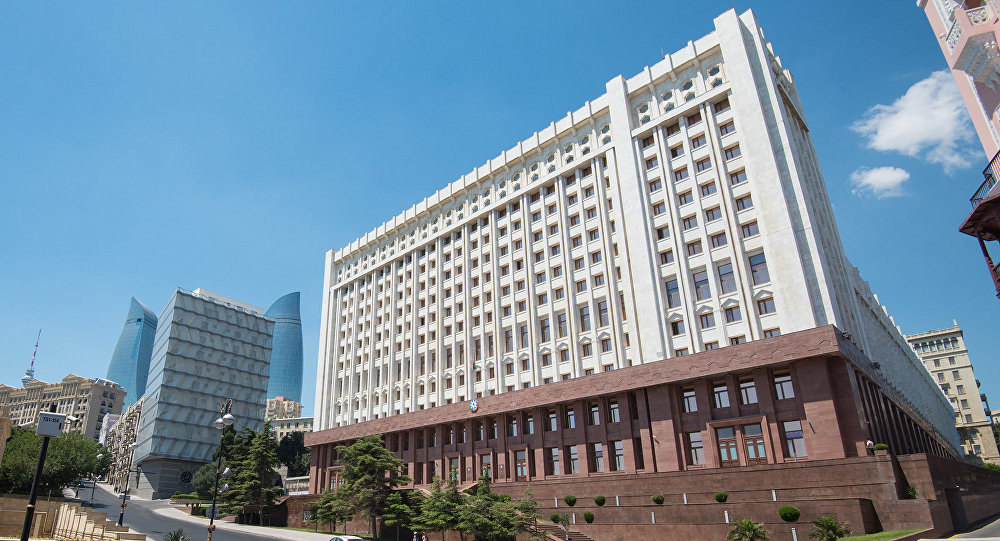
The Office prepares the bills for submitting it to Milli Majlis by the President, and also the drafts of decrees, directions, instructions of the President, and submits him/her the corresponding reports.
The Office of President controls and checks the execution of laws, decrees, instructions and orders of the President, presents him/her corresponding reports.
The Office of President provides the interaction between the President and political parties, public organizations, professional and creative unions in Azerbaijan, and also state bodies and officials of foreign states, local and foreign political and public figures, international organizations.
The Office of President analyzes the information on social-economical, political and legal processes in country and allover the world, the appeals and proposals of institutions of local governing, public associations and citizens, prepares corresponding reports.
The President presides via his/her Office.
The functioning of the Office is managed by a head of Office.
Everyone can contact the Office via writing or calling or visiting the responsible official.
The branch of letters of Office analyzes all letters and appeals received, sends it to the departments of Office or bodies of state power managing corresponding issues.
The most important information from letters and appeals are included into different reports and presented to the President.
Administrative Department of the President
Financial-technical and pecuniary ensuring of activity of the President and Office is managed by Administrative Department of the President. The Administrative Department is not part of the Office.
PRESIDENT OF THE AZERBAIJAN REPUBLIC

Ilham Heydar oglu Aliyev was born on 24 December 1961 in Baku.
He attended a secondary school No. 6 in Baku from 1967 to 1977.
In 1977-1982, he studied at Moscow State University of International Relations (MSUIR).
In 1982, he embarked on postgraduate studies at MSUIR.
In 1985, he defended a thesis to receive a PhD degree in history.
From 1985 to 1990, he gave lectures at Moscow State University of International Relations.
In 1991-1994, he was engaged in a private business sector and headed several private industrial and commercial enterprises.
From 1994 to August 2003, he was vice-president and first vice-president of the State Oil Company of Azerbaijan Republic (SOCAR). He has been actively involved in the implementation of national leader Heydar Aliyev’s oil strategy.
He is the author of a number of research papers on the geopolitical aspects of sovereign oil policy in Azerbaijan. He is a doctor of political sciences.
In 1995 and 2000, he was elected to the Milli Majlis (Parliament) of the Republic of Azerbaijan.
He has been president of the National Olympic Committee of Azerbaijan since 1997.
In 1999, he was elected as deputy chairman, in 2001 as first deputy chairman and in 2005 as chairman of the New Azerbaijan Party.
From 2001 to 2003, he headed the Azerbaijani Parliamentary delegation to the Parliamentary Assembly of the Council of Europe (PACE).
In January 2003, he was elected as deputy chairman of the Parliamentary Assembly of the Council of Europe and a member of the PACE Bureau.
On 4 August 2003, following the approval of the Milli Majlis, he was appointed as Prime Minister of the Republic of Azerbaijan. This terminated his power as a member of parliament.
On 15 October 2003, Ilham Aliyev was elected as President of the Republic of Azerbaijan with more than 76 percent of votes.
In 2004, he was awarded a medal and certificate of an honorary member of PACE.
On 15 October 2008, Ilham Aliyev was elected for the second term as President of the Republic of Azerbaijan, after gaining 88.73 per cent of votes.
As a result of the presidential election held on 9 October 2013, Ilham Aliyev was re-elected as President of the Republic of Azerbaijan with 84.54 per cent of votes.
In the election held on April 11, 2018, Ilham Aliyev gained 86.02 percent of votes and has been re-elected as the President of the Republic of Azerbaijan.
Mr. Ilham Aliyev is fluent in Azerbaijani, Russian, English, French, and Turkish languages.
He is married and has three children and five grandchildren.
Awards and honorary titles:
Orders
The Star of Romania Order (11 October, 2004)
King Abdul Aziz Order of the Kingdom of Saudi Arabia (8 March, 2005)
The first degree Order of Alexander Nevsky of the Academy of Problems of Security, Defense and Order of the Russian Federation (11 April, 2005)
Heydar Aliyev Order of the Republic of Azerbaijan (28 April, 2005)
Venerable Sergius of Radonezh first degree Order of the Russian Orthodox Church (14 September, 2005)
« Sheikhulislam » Order of the Caucasus Muslims Board (22 December, 2005)
Grand Cross of the Legion of Honor of the French Republic (29 January, 2007)
Grand Cross of Order of Merit of the Republic of Poland (26 February, 2008),
Order of Prince Yaroslav Mudry of 1st Class of Ukraine (22 May, 2008)
Mubarak Al-Kabeer Order of the State of Kuwait) (10 February, 2009)
Order of the Three Stars (Commander of the Grand Cross) of the Latvian Republic (10 August, 2009)
First degree Order of Honor of the Russian Orthodox Church (24 April, 2010)
The National Order « Faithful Service » in rank of Grand Cross Special Order of Romania (18 April, 2011)
The National Order « Faithful Service » of Romania (18 April, 2011)
Order of Stara Planina of the Republic of Bulgaria (14 November, 2011)
Order of « Ismoili Somoni » of Tajikistan (12 July, 2012)
Order of Friendship of Peoples of Belarus (28 August, 2012)
Order of State of the Republic of Turkey (12 November, 2013)
Order of Liberty of Ukraine (18 November, 2013)
Honorary academic titles
Honorary Doctor of Moscow State University of International Relations (7 February, 2004)
Honorary Professor of L. N. Gumilev Eurasian National University of Kazakhstan (1 March, 2004)
Honorary Doctor of Kirikkale University of Turkey (25 March, 2004)
Honorary Doctor of Bilkent University and Ihsan Dogramacı Prize for International Relations for Peace of Turkey (14 April, 2004)
Honorary Doctor of Petroleum and Gas University of Ploesti of Romania (12 October 2004)
Honorary Professor of University of National and World Economy of Bulgaria (23 September, 2005)
Honorary Doctor of Kyung Hee University of South Korea (24 April, 2007)
Honorary Doctor of the University of Jordan (29 July, 2007)
Honorary Doctor of Social Sciences of Corvinus University of Budapest of the Republic of Hungary (18 February, 2008)
Honorary Professor of Moscow State University of the Russian Federation (21 February 2008)
Honorary Doctor of Kiev National University named after Taras Shevchenko of Ukraine (22 May, 2008)
Honorary Professor of State University named after Makhtumkuli of Turkmenistan (28 November, 2008)
Honorary Doctor of Baku State University of Azerbaijan (2 November, 2009)
Honorary Professor of Belarus State University (12 November, 2009)
Honorary Doctor of Tajik National University (16 October, 2014)
Honorary Professor of History of Renmin University of China (11 December, 2015)
Awards from sports organizations
6th Dan Black Belt and certificate of World Taekwondo Federation (10 October, 2003)
Special Award of the International Wrestling Federation (FILA) (3 April, 2004)
Olympic Order of the International Olympic Committee (19 April, 2004)
Special Award of the European Amateur Boxing Association (1 May 2004)
« Grand Cordon » Order of Merit of the International Military Sport Council (27 May, 2005)
Honorary decoration of the International Confederation of Sport Organizations of CIS countries, (26 September, 2005)
« Sport Legend » Order of the International Wrestling Federation (FILA) (17 September, 2007)
The highest award of Belarus National Olympic Committee (26 October, 2007)
Olympic Order of Azerbaijan National Olympic Committee (27 December, 2007)
Honorary Diploma of 9th Dan of the World Karate Federation (20 March, 2008)
Badge of Honor of the European Fair Play Movement (15 May, 2009)
Paralympic Honor award of the International Paralympic Committee (26 June, 2015)
PLENARY POWERS
Article 109. Power of President of Azerbaijan Republic.
The President of the Azerbaijan Republic:
1) shall appoint elections to the Milli Mejlis of the Azerbaijan Republic;
2) shall submit the State budget of the Azerbaijan Republic to the Milli Mejlis for ratification;
3) approves State economic and social programs;
4) on co-ordination with the Milli Mejlis of the Azerbaijan Republic shall appoint the Prime-Minister of the Azerbaijan Republic and shall remove from position the Prime-Minister of the Azerbaijan Republic; the Milli Mejlis of the Azerbaijan Republic shall perform duties of the President of the Azerbaijan Republic.
5) shall appoint to position and remove from position members of the Cabinet of Ministers of the Azerbaijan Republic; in required cases shall preside at the meetings of the Cabinet of Ministers of the Azerbaijan Republic;
6) shall take a decision on resignation of the Cabinet of Ministers;
7) shall set up central and local executive bodies for exercising executive pointer within the expenses planned by the State budget of the Azerbaijan Republic;
8) shall annul the Resolutions and Orders of the Cabinet of Ministers of the Azerbaijan Republic, the Cabinet of Ministers of the Nakhichevan Autonomous Republic, Acts of central and local executive bodies;
9) shall submit a proposal to the Milli Mejlis of the Azerbaijan Republic on the appointment and removing from the position of judges of the Constitutional Court. The Supreme Court of the Azerbaijan Republic and the Economic Court of the Azerbaijan Republic; on co-ordination with the Milli Mejlis of the Azerbaijan Republic shall appoint and remove General Prosecutor of the Azerbaijan Republic from holding position; appoint to the position of judges of other courts of Azerbaijan Republic;
10) recommends the Milli Majlis of the Republic of Azerbaijan on appointing or dismissing the members of the Board of Directors of the Central National Bank of the Republic of Azerbaijan; appoints the Chairman of the Central Bank of the Republic of Azerbaijan from the members of the Board of Directors of the Central Bank of the Republic of Azerbaijan.11) shall submit military doctrine of the Azerbaijan Republic to the Milli Mejlis for ratification;
12) shall appoint and remove from position higher commanders of the Armed Forces of the Azerbaijan Republic;
13) organizes the Administration Executive Apparatus of the President of the Republic of Azerbaijan and appoints its Heads;
14) Shall recommend to the Milli Majlis of Azerbaijan Republic as regards the election of the Ombudsman of Azerbaijan Republic;
15) shall submit to the Milli Mejlis a proposal on establishing diplomatic representations of the Azerbaijan Republic in foreign countries and international organizations, appoint and recall diplomatic representatives of the Azerbaijan Republic in foreign States and international organizations;
16) shall accept credentials and letters of recall of the diplomatic representatives of foreign States;
17) signs interstate and intergovernmental international agreements; submits interstate international and intergovernmental agreements envisaging regulations other than those prescribed by the laws of the Republic of Azerbaijan, to the Milli Majlis of the Republic of Azerbaijan for approval or termination; signs the certificates;
18) shall appoint a referendum;
19) shall sign and issue laws;
20) shall settle the issues of citizenship;
21) shall decide issues on granting political asylum;
22) shall pass Acts on Granting Mercy;
23) shall grant State awards;
24) shall confer higher military and higher special ranks;
25) shall announce total or partial mobilization and demobilization;
26) shall take a decision on calling up citizens of the Azerbaijan Republic for urgent military service and transferring soldiers to the reserve;
27) shall found Security Council of the Azerbaijan Republic;
28) shall introduce representation to the Milli Mejlis of the Azerbaijan Republic on giving consent to enlist armed forces to the fulfillment of obligations not connected with their main destination;
29) shall declare emergency situation and martial law;
30) shall upon consent of the Milli Mejlis of the Azerbaijan Republic declare war and conclude peace;
31) shall set up special guard services;
32) shall in the executive order settle other issues not referred by the present Constitution to the power of the Milli Mejlis of the Azerbaijan Republic.
ELECTIONS
Article 101.Foundations for the Azerbaijan Republic Presidential Elections.
I. The President of the Azerbaijan Republic shall be elected for the term of 5 years via universal, direct and equal elections by free, individual and secret ballot.
II. The President of the Azerbaijan Republic is elected by the majority of more than the half of votes.
III. If this majority is not collected during the first round of elections, then the second round of elections shall be held on the second Sunday after the elections. Two candidates only, who have polled most votes in the first round, shall participate in the second round, or in case those candidates who have polled most votes have recalled their candidacies, it shall be two candidates following the first ones.
IV. The candidate who has collected in the second round a majority vote is considered to be elected President of the Azerbaijan Republic.
V. No one can be elected as the President of the Republic ofAzerbaijan more than twice. In case the conduct of the Presidential Election of the Republic of Azerbaijan is not held due to military operations under a state of war, the term of office of the President of the Republic of Azerbaijan shall be extended until the end of military operations. The decision on this matter shall be adopted by the Constitutional Court of the Republic of Azerbaijan on the basis of the application of the state body organizing elections (referendum).
VI. Procedure of implementation of the present Article is specified in legislation.
Article 102. Results of the Azerbaijan Republic Presidential Elections.
Information on the results of the elections shall be officially announced by the Constitutional Court of the Azerbaijan Republic within 7 days the elections.
Article 103. Oath of Allegiance of Person Elected President of Azerbaijan Republic.
I. A Person who has been elected President of the Azerbaijan Republic within 3 days starting from announcement day of the Presidential election results with the participation of Judges of the Constitutional Court shall take the following oath: « While executing power of the President of the Azerbaijan Republic I swear to observe the Constitution of the Azerbaijan Republic, defend sovereignty and territorial integrity of the State, to serve the people in a dignified manner ».
II. From the day of swearing in the president shall be considered to have entered upon his duties.
Article 106. Immunity of President of the Azerbaijan Republic.
I. The President of the Azerbaijan Republic shall have the right of immunity. II. The honor and dignity of the president of the Azerbaijan Republic shall be protected by Law.
MINISTRIES OF THE REPUBLIC OF AZERBAIJAN
The Cabinet of Ministers of the Republic of Azerbaijan is a supreme executive body established by the President of the Republic of Azerbaijan for the purpose of organizing the implementation of his executive powers, directly subordinate to and accountable to the President.
The Cabinet of Ministers consists of the Prime Minister of the Republic of Azerbaijan, his deputies, ministers, and heads of other central executive bodies.
At present, there are 17 ministries in the Republic of Azerbaijan.
Ministry of Foreign Affairs of the Republic of Azerbaijan
It is an executive body representing the Republic of Azerbaijan in relations with other states and international organizations, leading a unified system of diplomatic service bodies of the country, providing the dissemination of information about foreign and domestic policy, economic, social, and cultural life of the country abroad through diplomatic missions of the Republic of Azerbaijan.
Official website of the Ministry of Foreign Affairs of the Republic of Azerbaijan
Ministry of Internal Affairs of the Republic of Azerbaijan
It is a law enforcement body belonging to the executive power of the Republic of Azerbaijan. The purpose of the police in the Republic of Azerbaijan is to protect people’s life, health, rights and freedoms, legal interests, and property of the state, individuals, and legal entities from illegal actions.
Official website of the Ministry of Internal Affairs of the Republic of Azerbaijan
Ministry of Defense of the Republic Of Azerbaijan
It is an official state body carrying out military defense and activity of the Republic of Azerbaijan.
Official website of the Ministry of Defense of the Republic of Azerbaijan
Ministry of Justice of the Republic of Azerbaijan
It is the body of the Republic of Azerbaijan acting in the field of law.
Official website of the Ministry of Justice of the Republic of Azerbaijan
Ministry of Defense Industry of the Republic of Azerbaijan
It is the central executive body implementing state policy and regulation in the fields of defense, radio electronics, and instrument-making industries.
Official website of the Ministry of Defense Industry of the Republic of Azerbaijan
Ministry of Finance of Azerbaijan
It is a central executive body implementing financial policy in the Republic of Azerbaijan and organizing public finance management.
Official website of the Ministry of Finance of the Republic of Azerbaijan
Ministry of Economy of the Republic of Azerbaijan
Develops economic policy, economic and social forecasts of the Republic of Azerbaijan, including industry, structure, and innovation in the economy of the country, investment activity, attraction, investment and promotion of investments, development of entrepreneurship, state support to entrepreneurship, protection, development, and promotion of competition, elimination of unfair competition, protection of consumer rights, internal trade, foreign economic and trade relations, it is the central executive body implementing state policy and regulation in the areas of socio-economic development of Regions and housing and communal services.
Official website of the Ministry of Economy of the Republic of Azerbaijan
Ministry of Emergency Situations of the Republic of Azerbaijan
It is an organization of the Republic of Azerbaijan operating in the field of emergency situations.
Official website of the Ministry of Emergency Situations of the Republic of Azerbaijan
Ministry of Labor and Social Protection of Population of the Republic of Azerbaijan
It is an executive body that develops and implements the state policy in the field of labor, social protection, pensions, demography, and migration in accordance with the legislation.
Ministry of Agriculture of Azerbaijan
It is an appropriate executive body forming and implementing state policy in the field of Agriculture in Azerbaijan.
Official website of the Ministry of Agriculture of the Republic of Azerbaijan
Ministry of Culture of the Republic of Azerbaijan
The Ministry of Culture and Tourism of the Republic of Azerbaijan is an executive authority carrying out and regulating the state policy in the field of culture, arts, tourism, historical and cultural monuments, protection, publishing, and cinematography.
Official website of the Ministry of Culture of the Republic of Azerbaijan
Ministry of Education of the Republic of Azerbaijan
It is a state body operating in the field of education of the Republic of Azerbaijan.
Official website of the Ministry of Education of the Republic of Azerbaijan
The Ministry of Health of the Republic of Azerbaijan
It is the main executive body implementing the state policy in the field of public health protection in the territory of the Republic of Azerbaijan.
Official website of the Ministry of Health of the Republic of Azerbaijan
Ministry of Transport, Communications and High Technologies of the Republic of Azerbaijan
It is the central executive body implementing state policy and regulation in the fields of communications (telecommunications and post) and high technologies (information technology, microelectronics, space, nano, bio, and other innovative science-based technologies).
Ministry of Energy of the Republic Of Azerbaijan
It is a central executive body implementing state policy and regulation in the fuel and energy complex.
Official website of the Ministry of energy of the Republic of Azerbaijan
Ministry of Youth and Sports of the Republic of Azerbaijan
It is the executive power body that prepares and approves of the sport types available in the country, takes preventive measures within its competence to keep young people away from drugs, crime, and other harmful habits, and take an active part in the events held by the relevant executive power bodies and non-governmental organizations for this purpose.
Official website of the Ministry of Youth and Sports of the Republic of Azerbaijan
Ministry of Ecology and Natural Resources of the Republic of Azerbaijan
Central executive body carrying out state policy in the field of protection of the environment, organization of nature use, efficient use of groundwater, mineral resources and surface natural resources, their restoration, observation, and forecasting of hydro-meteorological processes in the territory of the Republic of Azerbaijan, including the Caspian Sea (lake) belonging to the Republic of Azerbaijan is the central executive body.
Official website of the Ministry of Ecology and Natural Resources of the Republic of Azerbaijan
COMMITTEES
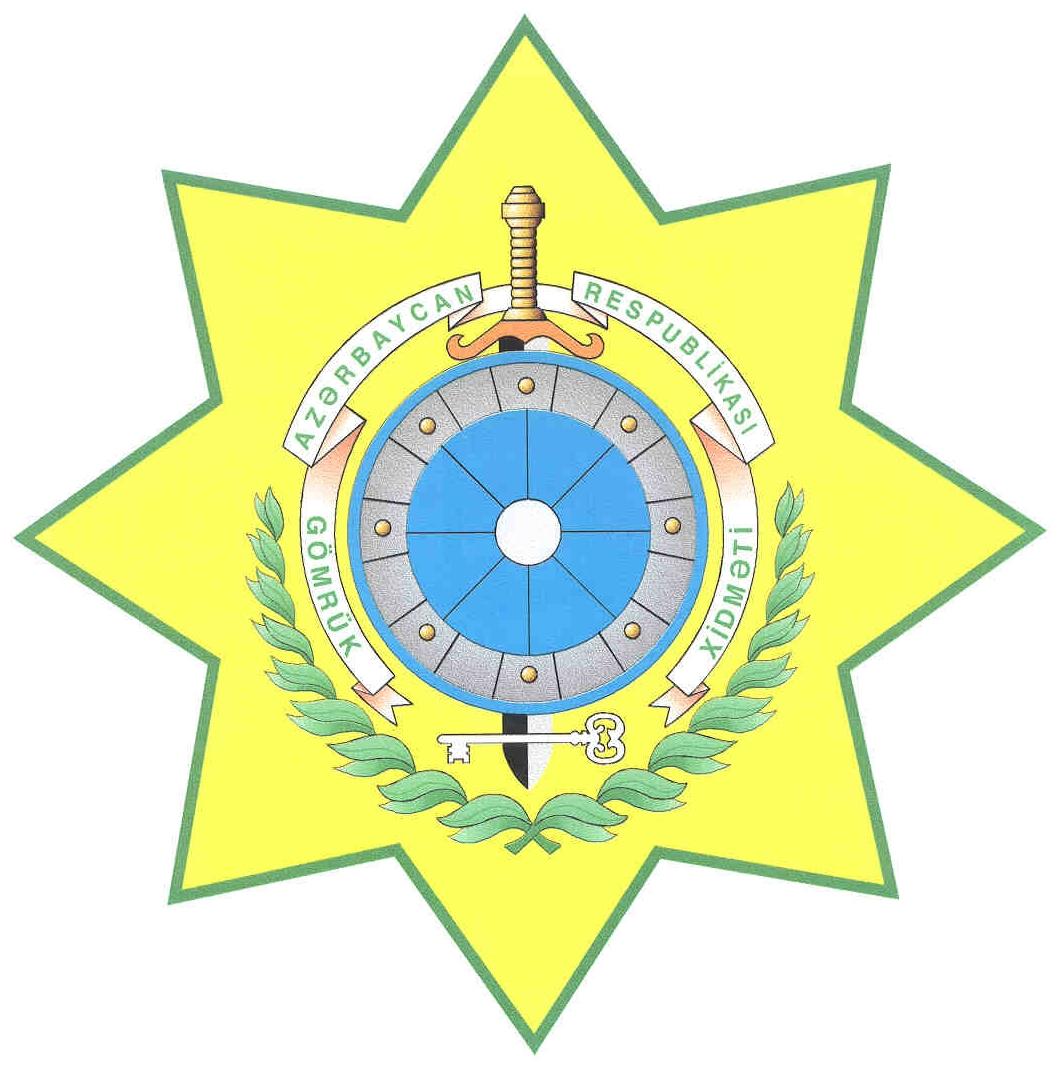
State Customs Committee of the Republic of Azerbaijan
The State Customs Committee of the Republic of Azerbaijan was established on January 30, 1992.
The State Customs Committee has expanded its structural activities in a very short historical period in order to speed up trade in our country, ensure the protection of the customs territory, as well as create favorable conditions for international relations, open new customs authorities and borders, customs posts, took an active part in the creation of the legislative framework in accordance with international standards and the adoption of the Customs Code, the formation of the state budget, which is one of the most important state tasks.
Important work is being done in our country to increase investment and create conditions for foreign businessmen who can play an important role in the development of our economy. The Customs Committee holds regular meetings with foreign businessmen operating in the country for cooperation. Joint measures are being taken to eliminate the problems facing them in connection with the customs case.
Official website of the State Customs Committee of the Republic of Azerbaijan
State Committee for Urban Planning and Architecture of the Republic of Azerbaijan
The Committee was established by the Order of the President of the Republic of Azerbaijan Ilham Aliyev dated February 28, 2006.
The Committee was involved in a unified urban development policy-making and continues to implement the policy, develop the zoning planning documents, exercise government supervision over compliance with these documents and perform regulatory activities in the relevant area. It also ensures the preservation of sensitive urban planning and national architectural traditions (heritage), identified by the country’s leadership, and effective use of their territories together with the relevant local authorities taking into account the natural and local context of cities and their historically established communities. The Committee’s activities include maintaining the urban-planning cadastre in accordance with the national legislation, ensuring the improvement of architectural planning solutions for buildings, installations, and facilities, overseeing their development in accordance with urban planning and construction standards and other areas defined in the legislation. In particular, the development of a regulatory framework plays a vital role in the Committee’s activities.
.png)
State Committee for Family, Women and Children Affairs of the Republic of Azerbaijan
State Committee for Family, Women and Children Affairs of the Republic of Azerbaijan was established by the Decree of the President of the Republic of Azerbaijan dated January 14, 1998. During its existence, the Committee has purposefully acted to address the existing problems in this area. However, the need for a comprehensive solution to the problems of the family and children in relation to women’s issues has led to the establishment of a single public administration body. In this connection, the State Committee for Family, Women and Children Affairs was established by the Decree of the President of the Republic of Azerbaijan dated February 6, 2006. State Committee for Family, Women and Children Affairs of the Republic of Azerbaijan is the central executive body implementing state policy and regulation in the field of work with family, women and children.
The activities of the Committee are as follows:
- participates in the formation of a unified state policy in the relevant field and ensures the implementation of this policy;
- ensures the development of the relevant field;
- operates in other directions determined by the legislation.
Official website of the State Committee for Family, Women and Children of the Republic of Azerbaijan
State Statistics Committee
The State Statistics Committee of the Republic of Azerbaijan provides the operation of a system of statistical data on the basis of a single methodology in the economic and social spheres of the country. The State Statistics Committee is an independent central economic state management body operating in the system of central executive bodies of the Republic of Azerbaijan, managing statistics and accounting.
The State Statistics Committee carries out its activities on the principles of objective and comprehensive study of socio-economic processes in the country, ensures the transparency of information on the socio-economic situation in the country, respects the rights of legal entities and individuals and enhances the role of statistics and responsible for the implementation of the directed policy.
Official site of the State Statistics Committee of the Republic of Azerbaijan
.jpg)
The State Committee on Work with Diaspora of the Republic of Azerbaijan
One of the most important events of the past period was the establishment of the State Committee on Affairs with Diaspora on the basis of the State Committee for Work with Azerbaijanis Living Abroad by Order No. 54 of the President of the Republic of Azerbaijan dated November 19, 2008. Contemporary, the diaspora concept becomes an essential element of international relations. The reality of our globalized world sets new tasks in the field of Diaspora building. Rapid integration processes among nations, the growing role of diaspora and lobbying organizations in international politics have made it a historic necessity for more broad-based activities in this area. Establishment of the State Committee on Affairs with Diaspora was precisely this necessity.
Establishment of the State Committee on Affairs with Diaspora expand opportunities for establishing direct cooperation with diaspora organizations of other nations and government agencies that directly responsible for the various countries.
Official website of the State Committee for Work with the Diaspora of the Republic of Azerbaijan
The State Committee on Religious Associations of the Republic of Azerbaijan
The State Committee on Religious Associations of the Republic of Azerbaijan is the central executive body that ensures the implementation of state policy in the field of religious activity, compliance with the legislation on religious organizations, coordination of activities of relevant executive authorities with regard to religious organizations.
The State Committee on Religious Associations of the Republic of Azerbaijan issues a bulletin every two months to inform the public.
Official website of the State Committee on Religious Associations of the Republic of Azerbaijan
State Committee for Affairs of Refugees and Internally Displaced Persons of the Republic of Azerbaijan
In accordance with the Regulations approved by the Decree of the President of the Republic of Azerbaijan No. 187 of February 1, 2005, the main tasks of the Committee are temporary settlement, repatriation, social protection of refugees, IDPs and persons seeking refugee status, purposeful work with relevant government agencies, international and non-governmental organizations in order to increase employment, reduce poverty, create conditions for refugees and IDPs to return to their places of forced leave, provide them with housing and social facilities, repair and construction work, provision with relevant design and estimate documents, etc. to participate in the formation of state policy in the field of problem solving and to ensure its implementation.
AGENCIES
State Tourism Agency of the Republic of Azerbaijan

On April 24, the Ministry of Culture and the State Tourism Agency of the Republic of Azerbaijan were established on the basis of the Ministry of Culture and Tourism of the Republic of Azerbaijan in accordance with the Order of the President of the Republic of Azerbaijan dated April 21, 2018 “On new composition of the Cabinet of Ministers”.
The Agency shall formulate and implement a unified state policy in the field of tourism, implement normative activities in the field of tourism, state regulation, state control and coordination, other state bodies, enterprises and organizations, as well as individuals and legal entities, including international and non-governmental to ensure coordinated activities between organizations, to organize the purposeful use and preservation of the territories of the reserves, to ensure the protection and promotion of national culinary samples.
Official website of the State Tourism Agency of the Republic of Azerbaijan

Food Safety Agency of the Republic of Azerbaijan
According to the Decree of the President of the Republic of Azerbaijan, the « Regulations on the Food Safety Agency of the Republic of Azerbaijan » were approved.
The Food Safety Agency of the Republic of Azerbaijan is a central executive authority, which fulfills the following functions: legal regulation of food safety standards (preparation and adoption of sanitation norms and hygiene standards), risk assessment, official registration of food products and their packaging materials, issue of food safety certificates to exported food products, state control over food safety and protection of rights of food product consumers at all stages of food supply chain, including food production, supply, packaging, storage, transportation and trading (including import and export operations), use in catering and service sector, utilization and disposal (except for veterinary, plant protection and quarantine fields) as well as implementation and regulation of state policy in the aforementioned areas.
Official website of the Food Safety Agency of the Republic of Azerbaijan
ADMINISTRATIONS
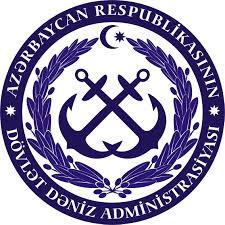
State Maritime Agency of the Republic of Azerbaijan
The State Maritime Administration is the central executive body implementing state policy and regulation in the field of maritime transport in the territory of the Republic of Azerbaijan in accordance with the Regulations approved by the Decree of the President of the Republic of Azerbaijan No. 395 dated April 20, 2006.
The Chief and Deputy Chiefs of the State Maritime Administration are appointed by the Order of the President of the Republic of Azerbaijan.
The staff of the State Maritime Administration consists of 48 people. Most of the employees in the administration are highly qualified specialists with extensive experience and expertise in the relevant field.
The Administration is guided by the Constitution of the Republic of Azerbaijan, laws of the Republic of Azerbaijan, Decrees and Orders of the President of the Republic of Azerbaijan, decisions and orders of the Cabinet of Ministers of the Republic of Azerbaijan, international agreements to which the Republic of Azerbaijan is a party.
Official website of the State Maritime Agency of the Republic of Azerbaijan
State Civil Aviation Agency of the Republic of Azerbaijan

It was established by the Decree of the President of the Republic of Azerbaijan No. 512 dated December 29, 2006 and is the central executive body exercising control, state policy and regulation in the field of civil aviation. The total number of administrative staff is 49. Maintenance costs and activities of the administration are financed from the state budget of the Republic of Azerbaijan.
The administration consists of five departments:
- Flight safety control department;
- Aviation Security Department;
- Department of licensing and maintenance of registers;
- Foreign Relations Department;
- Finance and Economics Department.
The Administration has a board consisting of the director, his deputies and heads of structural units of the Administration, as well as the Higher Qualification Commission under the Administration and the Commission for Certification and Licensing of Civil Aviation Entities in the Republic of Azerbaijan.
Official website of the State Civil Aviation Agency of the Republic of Azerbaijan
SERVICES
State Security Service of the Republic of Azerbaijan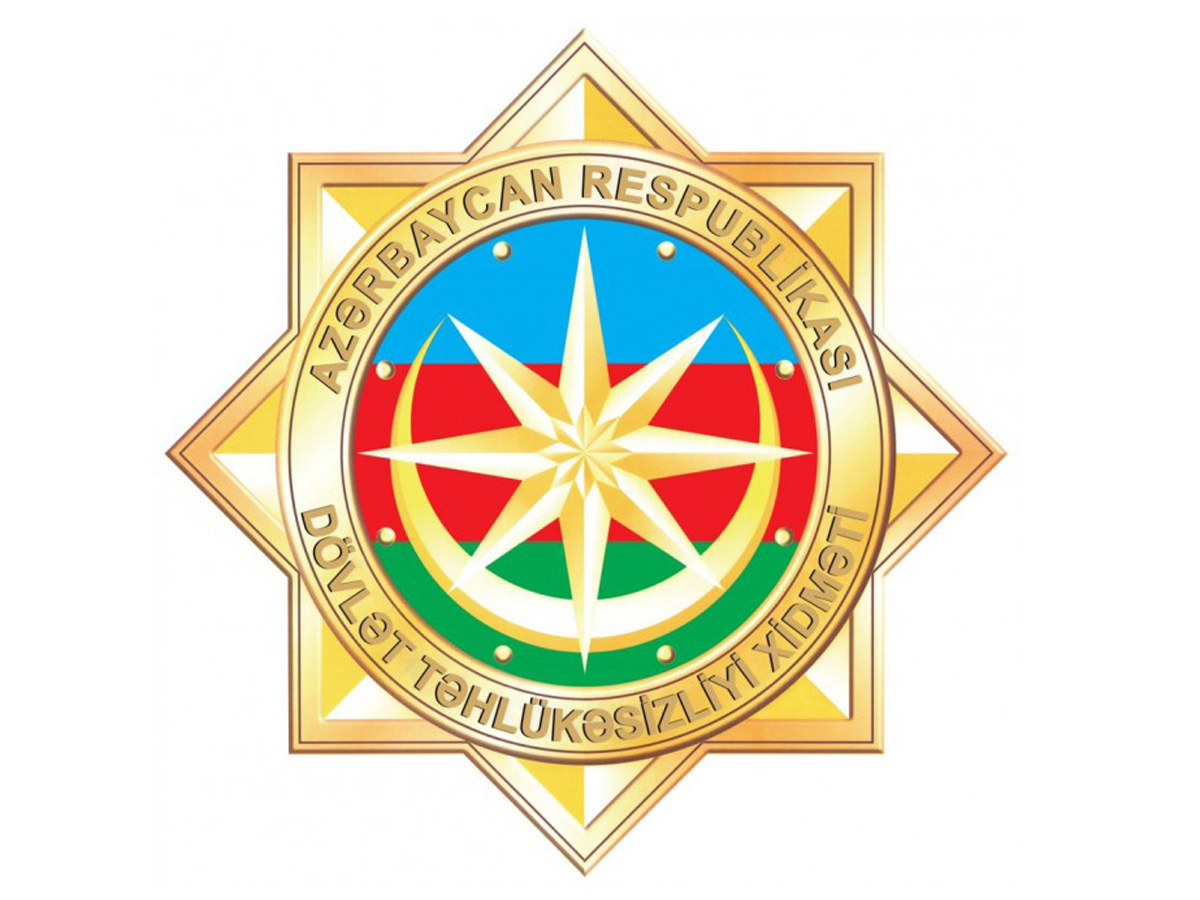
By Decree No 706 of President Ilham Aliyev dated 14 December 2015, the State Security Service of the Republic of Azerbaijan was established on the basis of the Ministry of National Security of the Republic of Azerbaijan.
The legal basis of the activities of the State Security Service contains the Constitution of the Republic of Azerbaijan, the laws and legislative acts of the Republic of Azerbaijan: “Intelligence and counterintelligence activities”, “On national security”, “On the fight against terrorism”, “On operational-investigative activities”, “On state secret” and others, the statute of State Security Service of the Republic of Azerbaijan, decrees, and orders of the President of the Republic of Azerbaijan, resolutions, and Orders of the Cabinet of Ministers of the Republic of Azerbaijan, central executive bodies` normative legal acts adopted following legislation, international agreements signed by the Republic of Azerbaijan following the laws of the Republic of Azerbaijan.
State Security Service operates following commitments of observing the human and civil rights and freedom, humanism, the principle of responsibility for the state and society.
Official website of the State Security Service of the Republic of Azerbaijan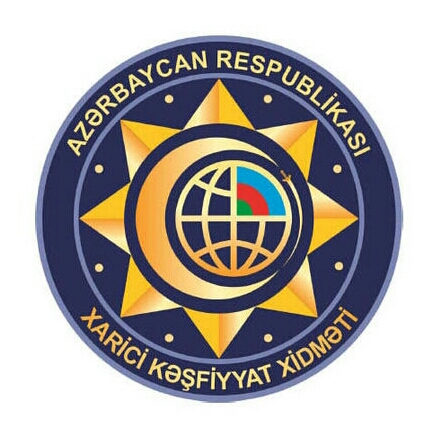
Foreign Intelligence Service of the Republic of Azerbaijan
It is a special state body established on the basis of the Ministry of National Security of the Republic of Azerbaijan by the Decree of the President of the Republic of Azerbaijan dated December 14, 2015, 706.
Official website of the Foreign Intelligence Service of the Republic of Azerbaijan
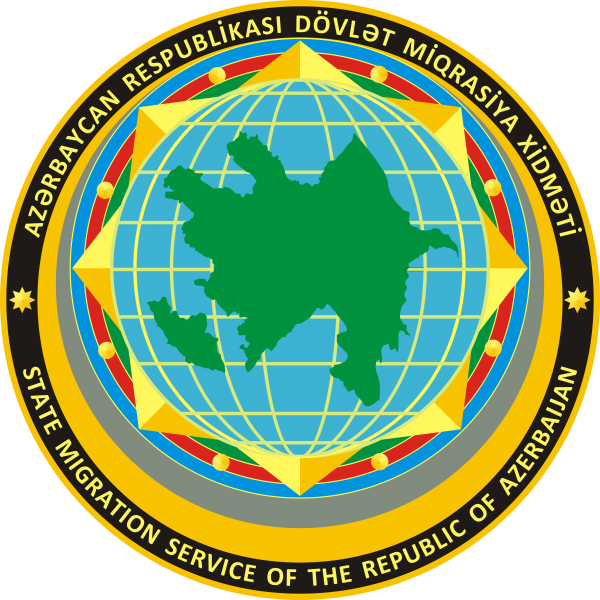
State Migration Service of the Republic of Azerbaijan
The State Migration Service is a central executive body with the status of a law enforcement body, which implements the state policy in the field of migration, the competencies defined by the legislation of the Republic of Azerbaijan in the management and regulation of migration processes. The State Migration Service of the Republic of Azerbaijan was established by the Decree of the President of the Republic of Azerbaijan “On the establishment of the State Migration Service of the Republic of Azerbaijan” № 560 dated March 19, 2007.
The State Migration Service is guided by the Constitution, laws of the Republic of Azerbaijan, decrees, and orders of the President, decisions, and orders of the Cabinet of Ministers, international agreements to which the Republic of Azerbaijan is a party and its Statute. In carrying out its duties and exercising its rights, the State Migration Service interacts with the central, local executive authorities and local self-government bodies, as well as with international and non-governmental organizations. Most importantly, the State Migration Service operates on the principles of respect for human and civil rights and freedoms, the rule of law, and humanism.
Official website of the State Migration Service of the Republic of Azerbaijan
The State Border Service of Azerbaijan Republic

It is the central executive body established by the Decree of the President of the Republic of Azerbaijan No. 740 dated July 31, 2002, exercising the powers defined by the legislation of the Republic of Azerbaijan in the field of protection of the state border of the Republic of Azerbaijan.
The State Border Service carries out the tasks assigned to it directly and through subordinate military units and other bodies. The structure of the State Border Service includes head offices, departments, divisions, and other agencies. The central office of the State Border Service, border detachments, naval and military aviation units, border control units, military units, as well as other structural units form a single system of the State Border Service.
Official website of the State Border Service of the Republic of Azerbaijan
National Archive Department of Azerbaijan

The National Archive Office of the Republic of Azerbaijan was established on the basis of the General Archive Department at the Cabinet of Ministers of the Republic of Azerbaijan under the Decree 816 of the Decree of the President of the Republic of Azerbaijan « On Improving Archive Work in the Republic of Azerbaijan ».
The responsibilities of the National Archives include:
- participation in policy building in regards to the management of national archives;
- ensuring acceptance, protection, and careful use of the archival documents related to cultural heritage and history of Azerbaijan as well as documents of scientific, historical, social, economic, importance as well as historical and cultural heritage of Azerbaijan located outside the Republic of Azerbaijan to ensure the reception, protection and use of related archival documents;
- collection, categorization, accounting, and management of archival resources;
- to coordinate the work of the state archives and branches of the state archives directly subordinated to the Department and to ensure their activity.
Official website of the National Archives of the Republic of Azerbaijan
The State Service for Mobilization and Conscription of the Republic of Azerbaijan
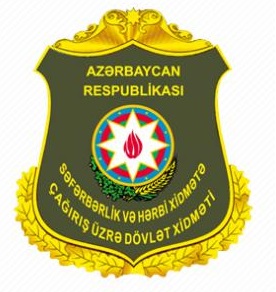
The State Service for Mobilization and Conscription of the Republic of Azerbaijan is the central executive authority exercising the state policy and regulation in the fields of military-patriotic education of the citizens of the Republic of Azerbaijan, training prior to conscripting to active military service, call for active military service, reserve service, mobilization preparation and call for mobilization, preparation for special military specialties, provision of the Armed Forces of the Azerbaijan Republic with conscripts at peacetime, with the military personnel and military vehicles of the armed forces and other armed units, as well as of the special units during the mobilization and during the war, as well as with civil staff for working in the civilian positions.
The Service is guided by the Constitution of the Republic of Azerbaijan, international treaties to which the Republic of Azerbaijan is a party, laws of the Republic of Azerbaijan, decrees, and orders of the President of the Republic of Azerbaijan, decisions, and resolutions of the Cabinet of Ministers of the Republic of Azerbaijan, « Statute on the State Service for Mobilization and Conscription of the Republic of Azerbaijan » and regulatory legal acts of the Service.
HISTORY OF PARLIAMENT
The Azerbaijan Democratic Republic and its Parliament came to the scene in a very difficult and complicated historical period. The special governing committee for the Transcaucasia made of the elected members of the Transcaucasian State Duma was formed after the February 1917 revolution in Russia. The Transcaucasian Commissariat was established in November. Those Transcaucasian delegates who had been elected to the Russian Constituent Assembly but could not join its proceedings after the Bolshevik coup of October were gathered in Tiflis on 14 February 1918. There, they founded the Transcaucasian Sejm as the supreme power in the Transcaucasia.
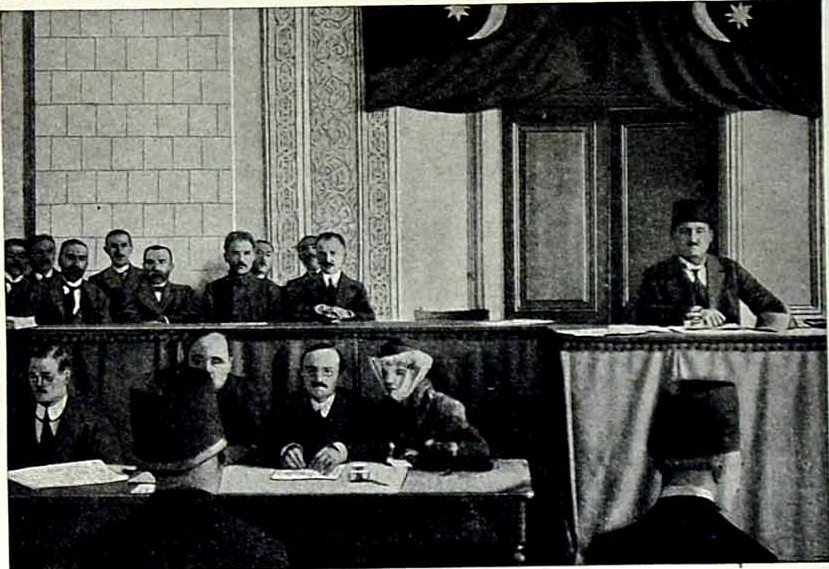
A day after the collapse of the Transcaucasian Sejm, namely, on 27 May, the 44 Muslim Sejm delegates are assembled in Tiflis to incept the first Azerbaijani government. Having come to the decision to assume the control of the country, they declare themselves the National Council of Azerbaijan and M. A. Rasulzade is elected its chairman.
The National Council of Azerbaijan passes the Declaration of Independence of Azerbaijan at a meeting chaired by Hasan bey Agayev on 28 May 1918.
The National Council and the Government moved from Tbilisi to Ganja on 16 June 1918.
The Caucasian Islamic Army liberated Baku after bitter fighting on 15 September 1918 and the F.Kh.Khoyski government moved in from Ganja as soon as on the 17th. Baku was declared the capital of the Azerbaijan Democratic Republic. The Azerbaijan National Council that stopped its work in Ganja on 17 June 1918 resumed it on 16 November that year. At the first meeting then, the National Council accepted the job of convening the Constituent Assembly upon the request of F.Kh.Khoyski. It was said at the meeting of the National Council chaired by M. A. Rasulzade on 19 November that the National Council of Azerbaijan had to represent all the peoples living in the territory of the country.
Thus, it is decided to form a Parliament of Azerbaijan that was to consist of 120 members going by 1 delegate per 24,000 people — 80 Muslims, 21 Armenians, 10 Russians, 1 German and 1 Jew. The law that the National Council passed in this connection stipulated that all the ethnic minority representatives would be included. As regards the Muslims, 44 members of the National Council elected by popular vote would join the new Parliament as its members while more people would be brought in to occupy the remaining 36 seats. The law also determined the number of additional delegates per town and district.
The proclamation ‘To the Whole of the Population of Azerbaijan!’ was issued on 29 November 1918 on behalf of the National Council of Azerbaijan and assigned by its Chairman M.A.Rasulzade.
The first sitting of the first parliament in the Muslim East was opened at the former H Z Taghiyev School for Girls in Nikolayev Street (Istiglaliyat nowadays) on 7 December 1918. The National Council Chairman M. A. Rasulzade who had opened the Parliament delivered a great congratulatory speech, too.
A Topchubashev was elected Chairman of the Parliament and Hasanbey Agayev his First Deputy.
Besides, they elected the 3-strong Secretariat of the Parliament with Mehdi bey Hajinsky elected as the Secretary-General.
Then, the Provisional Government Chairman F. Khoyski tables a performance report and petitions to the Parliament for the resignation of the Government.
The Government accepts the resignation of the Khoyski Government — only to commission him to form a new one. F. Khoyski reports in the Parliament on the government programme and make-up on 26 December. The programme is approved, and the new Government is given a vote of confidence.
The Parliament of Azerbaijan was building its work along with the organisational principles inherent in democratic republics from the very day of inception. The Parliament had 96 members representing 11 various party factions and groups as soon as the end of 1919.
All the party fractions and groups declared their activity programmes. All those declarations had as their shared goals the preservation of the independence and territorial integrity, and the national as well as political rights of the young Azerbaijan Republic, creation and reinforcement of friendly ties of the Azerbaijani people and government with other nations and states, in particular, with the neighbouring states and building up a legal democratic state order, implementing extensive social reforms and building a strong army capable of protecting the country.
Though only active for 17 months, the Parliament of the Azerbaijan Democratic Republic was able to prove its viability and a high working capacity. It demonstrated that, indeed, the people of Azerbaijan had graduated to the level of parliamentary governance. The Azerbaijan Republic was the sole parliamentary republic in the Muslim East at that time.
The Parliament of the Azerbaijan Democratic Republic held 145 sessions in that period; the first one was on 7 December 1918 and the last on 27 April 1920.
More than 270 draft laws were tabled in the Parliament of the Azerbaijan Republic and approximately 230 of them were passed whilst the Parliament remained active.
The Parliament’s work was regulated by ‘the admonishment (instruction) of the Parliament of Azerbaijan’, which played the immediate role as its Charter.
There were 11 commissions in Parliament.
Azerbaijan discontinued its work done to strengthen the independent state with the occupation of 28 April 1920. Azerbaijan, a country that had gained actual international recognition as a result of the long and hard efforts, had only been able to remain independent for 23 months.
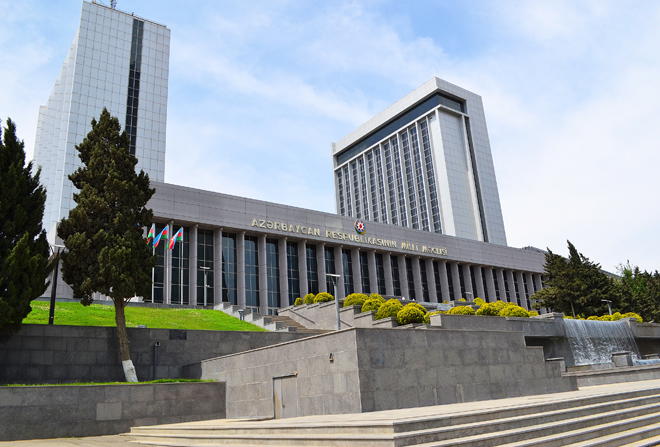
The Parliament of the ADR decided ‘to transfer the power to the Bolsheviks’ after the intense deliberations on the ultimatum (demand) of the Central Committee of the AC (b) P and the Transcaucasian Regional Committee of the RC (b) P whilst besieged by the 11th Red Army of Russia and facing the imminent military threat from the Russian Caspian Fleet. The resulting decision put a number of conditions to the Bolsheviks who had seized the power, such as preservation of the independence, the provisional nature of the government established by the Bolsheviks, and shaping of the future governance form of Azerbaijan by a new parliament that would be assembled in the nearest future.
Though the Azerbaijan SSR had formal independence, Soviet Russia considered the country as its colony from day one.
The political independence of Azerbaijan was completely formal in nature already. They started organizing a representative governance system to create the illusion that the power belonged to the people. The All-Azerbaijan Congresses of Soviets was held in the following sequence during 1921-1937:
I All-Azerbaijan Congress of Soviets — 6-19 May 1921;
II All-Azerbaijan Congress of Soviets — 28 April-03 May 1922;
III All-Azerbaijan Congress of Soviets — 25 November-01 December 1923;
IV All-Azerbaijan Congress of Soviets — 10-16 March 1925;
V All-Azerbaijan Congress of Soviets — 18 March 1927;
VI All-Azerbaijan Congress of Soviets — 1-9 April 1929;
VII All-Azerbaijan Congress of Soviets — 19-25 January 1931;
VIII All-Azerbaijan Congress of Soviets — 11-17 January 1935;
IX All-Azerbaijan (extraordinary) Congress of Soviets — 17 November 1936-; 10-14 March 1937
However, the Bolsheviks began to work towards the abolition of the remaining independence of Azerbaijan in the name of achieving their political goals. On December 10-13, 1922, 175 deputies from Azerbaijan took part in the first congress of the Caucasian Soviets. At this Congress, the Central Executive Committee of the Caucasus (150 members and 50 candidates) was elected.
The decision incepting the USSR and made at the 1st All-Union Congress of Soviets in Moscow on 30 December 1992 put an end to the independence of Azerbaijan. In March 1927, the 5th All-Azerbaijani Congress of Soviets adopted the II constitution of the Azerbaijan SSR, developed on the example of the Russian constitution. So far, the changes implemented in the political and economic structure of the Republic by violent methods have been enshrined in the Constitution. In 1937, by the adoption of the new Constitution of the Azerbaijan SSR at the IX extraordinary Soviet Congress, the legislative body entered a new stage.
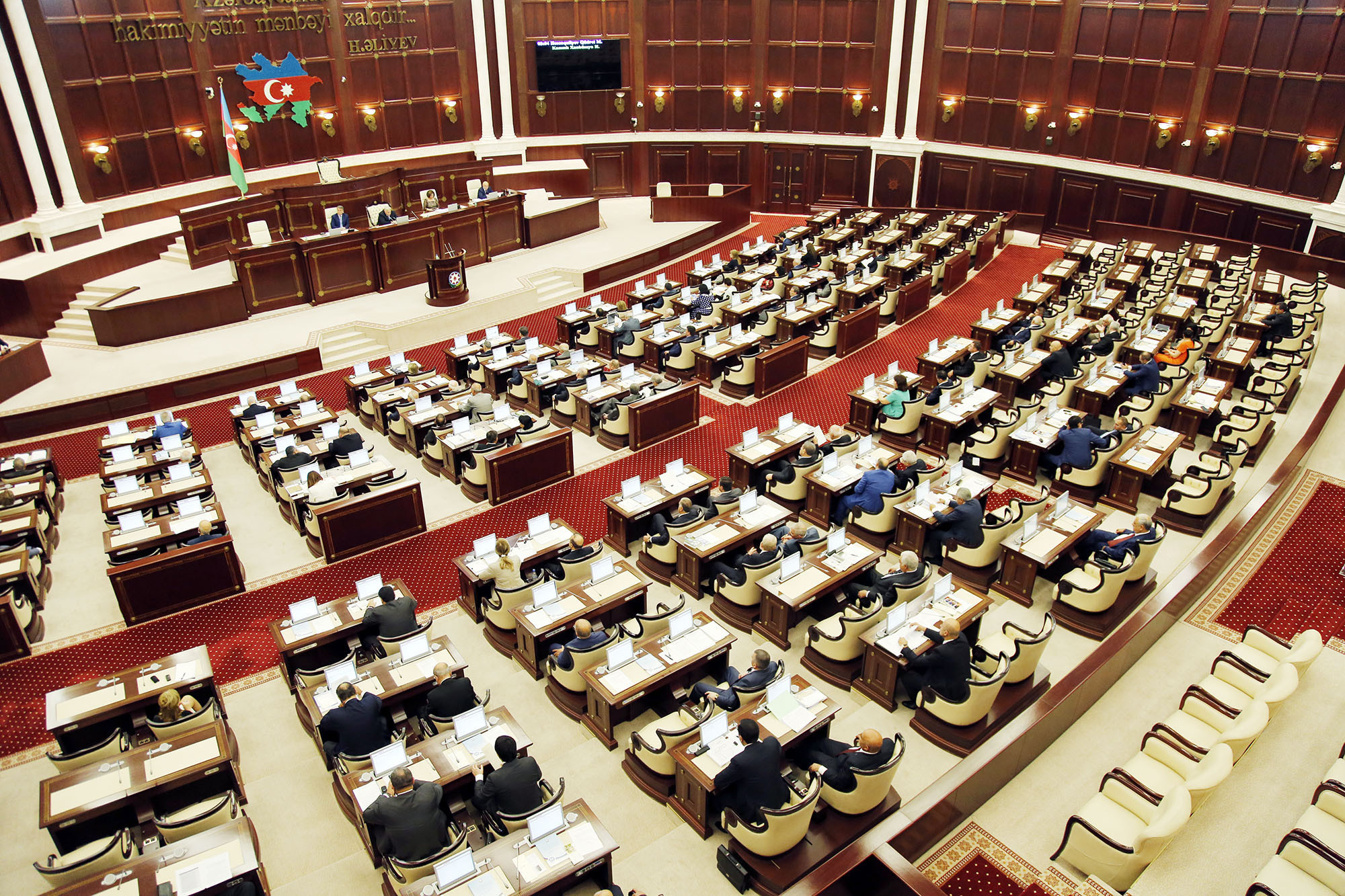
The legislative body of Azerbaijan was reformatted in accordance with the newly adopted Constitution in that it was made the Supreme Council of the Republic. But that was not merely a format change: rather, it was now determined ‘upstairs’ who the MPs were going to be, who was to be elected, how many factory workers, collective farmers, public servants, women, youth and independents had to be in the parliament and so forth. Of the 310 MPs elected directly to the first-convocation Supreme Council of the Azerbaijan SSR on 24 June 1938, 88 were collective farmers and 115 intelligentsia and public services — with 72 of those women. The Supreme Council could not function effectively while the Communist Party had taken hold of all the state functions and took a hostile stance towards any political initiative.
That was why the Azerbaijanis elected to the representative legislative bodies could not raise their voices in 1937-1938 and in the years that followed against the destruction of the academic, cultural and political elites of the Republic, the blow to the national gene pool and the transfer of more and more lands to Armenia. On the contrary, the Supreme Council of the Azerbaijan SSR approved, acting under the pressure applied from on high, on 7 May 1938 a protocol on giving Armenia 2,000 hectares of land in the Lachin, Gubadli, Kalbajar and Gazakh provinces. Still, the ordinary people and the rural communities resisted such a decision and did not let go of their lands. On 7 May 1960, the Presidium of the Supreme Council of the Azerbaijan SSR reaffirmed that notorious decision of 7 May 1938 but Mr Heydar Aliyev who rose to power shortly afterwards did not allow it to be carried out.
Heydar Aliyev, once elected the First Secretary of the CC of the CP of Azerbaijan, began the steps to use what limited opportunities were there for the good of the people and to promote the national and spiritual reawakening without attracting attention to his actions.
The legal codes were amended and expanded in the 1970s and the early 1980s. Azerbaijan passed the laws on the judicial system, health care, state notary services, public education, protection of the monuments of history and culture, the Council of Ministers and the Soviets of People’s Deputies as well as the land and labour codes, the Code of Administrative Offences, the Family Code and the Marriage Code.
The then administration and parliament of Azerbaijan manifested the unpardonable passivity and indifference in the face of the Armenian separatism rearing its head in the country as well as of the actual aggression from Armenia on the brink of the collapse of the USSR in 1988.
Heydar Aliyev who had returned to Nakhchivan to be by the nation’s side in those hard days was elected a member of the Supreme Council of the Azerbaijan SSR and the Supreme Council of the Nakhchivan AR. That started a new period in Heydar Aliyev’s work in the Azerbaijani statehood and in the struggle for independence. On October 18, 1991, with the adoption of the Constitutional Act on the restoration of state independence in the parliament, Azerbaijan became independent. As a result of a deal between the authorities and the opposition, the Supreme Majlis of Azerbaijan passed the authority to the National Majlis consisting of 50 of its own members. The Parliament cancelled the procedure whereby the chairman of the Parliament of the Nakhchivan AR was also deputy chairman of the Parliament of Azerbaijan; besides, they introduced an age limit for the presidency and so on. All those undemocratic moves were directed against Heydar Aliyev personally: he had been elected chairman of the Supreme Majlis of the Nakhchivan AR and commanded great respect from the people. They were trying to curb the political activism of the great leader in that manner. The nation that had grown of political instability, anarchy and coups called upon its outstanding son, the chairman of the Supreme Majlis of the Nakhchivan AR Heydar Aliyev, to come back to power. Helpless in the face of the steepening crisis, the near brush with a civil war and the aggression from Armenia, the leaders of the Republic who had also fallen hostage to the situation of their own making had to join their voices in the demand of the Azerbaijani people, too. That was already the independent Parliament of Azerbaijan serving the national interests.
The first convocation elected on November 12, 1995, was the Milli Majlis of the Republic of Azerbaijan in 1995-2000.
The second convocation elected on November 5, 2000, was the Milli Majlis of the Republic of Azerbaijan in 2000-2005.
The third convocation elected on November 6, 2005, was held in 2005-2010 by the Milli Majlis of the Republic of Azerbaijan.
The fourth convocation elected on November 7, 2010, was held in the period of 2010-2015 by the Milli Majlis of the Republic of Azerbaijan.
The fifth convocation, elected on November 1, 2015, is currently functioning at the Milli Majlis of the Republic of Azerbaijan.
STRUCTURE OF THE MILLI MAJLIS (NATIONAL ASSEMBLY)
The Chairman of the Milli Majlis, First Deputy Chairman of the Milli Majlis, Deputy Chairman of the Milli Majlis, Deputy Chairman of the Milli Majlis, Administration of Milli Majlis, Department of affairs of Milli Majlis, Azerbaijan newspaper, Chamber of accounts, Toponymy Commission, Milli Majlis Journal, Disciplinary Commission, Accounting Commission
The Committees
The Committee for Law Policy and State-Building
The Defence, Security and Counter-Corruption Committee
The Committee for Natural Resources, Energy and Ecology
The Committee for Economic Policy, Industries, and Enterprising
The Labour and Social Policy Committee
The Committee for Family and Women’s and Children’s Affairs
The Youth and Sports Committee
The Committee for Public Associations and Religious Institutions
The Committee for Regional Affairs
JUDICIAL POWER
After Azerbaijan gained independence, fundamental reforms were carried out in the legal system of the country. These reforms, which serve to create a truly democratic society based on the national, cultural, and historical traditions of the Azerbaijani people, are primarily aimed at ensuring human rights more reliably. One-third of the provisions of the first democratic Constitution of the country, developed in 1995 in accordance with democratic values and principles and adopted by popular vote, were devoted to human rights and freedoms, the principle of separation of powers was established. Considered by international experts as one of the democratic constitutions of the world, this Constitution laid a solid foundation of the democratic system and legal state in Azerbaijan and paved the way for carrying out legal reforms.
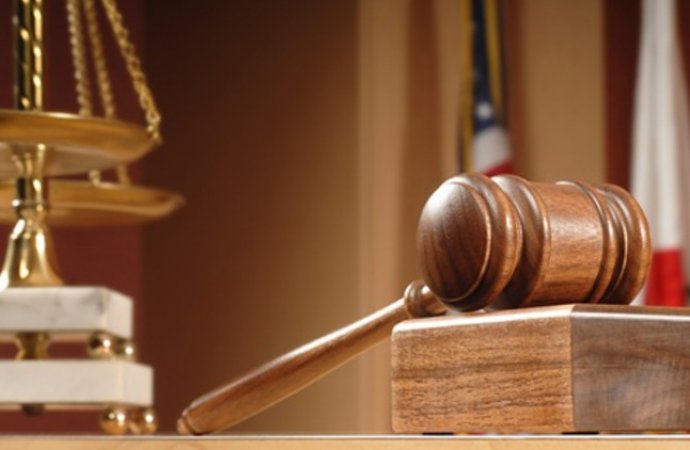
As a result of the judicial-legal reform conducted under the leadership of the national leader of the Azerbaijani people Heydar Aliyev, the legal system of the country inherited from the former Soviet Union has been completely reconstructed on the basis of democratic principles.
In accordance with the reforms, new progressive laws, including the laws « on Constitutional Court », « on Courts and Judges », « On Prosecutor’s Office », « on Police », « on Operational-search activity » and others, which are fundamentally different from the previous ones: Civil and Civil Procedure, Criminal and Criminal Procedure, execution of sentences, etc. codes have been adopted. All these laws were developed in accordance with the requirements of democratic principles and norms of international law and were highly appreciated by international experts.
As a result of the reform of the legal system, a new three-tier independent judicial system consisting of First Instance, appellate, and Cassation instances was established in the country.
Measures to improve the judicial system in our country are always kept on the agenda. The president of the Republic of Azerbaijan Mr. Ilham Aliyev signed the decree on modernization of the judicial system dated January 19, 2006, and the judicial reform has reached a qualitatively new stage.
In recent years, new courts, including new courts of Appeal have been established, the number of judges has been increased 2 times, the structure of the court apparatus has been improved in order to increase the efficiency of Justice, facilitate the access of the population to the courts and develop the country’s regions. The Academy of justice was established and started its activity.
At present, district (city) courts operate as a court of First Instance in the Republic of Azerbaijan, military, local administrative-economic, and grave crimes courts operating under territorial jurisdiction.
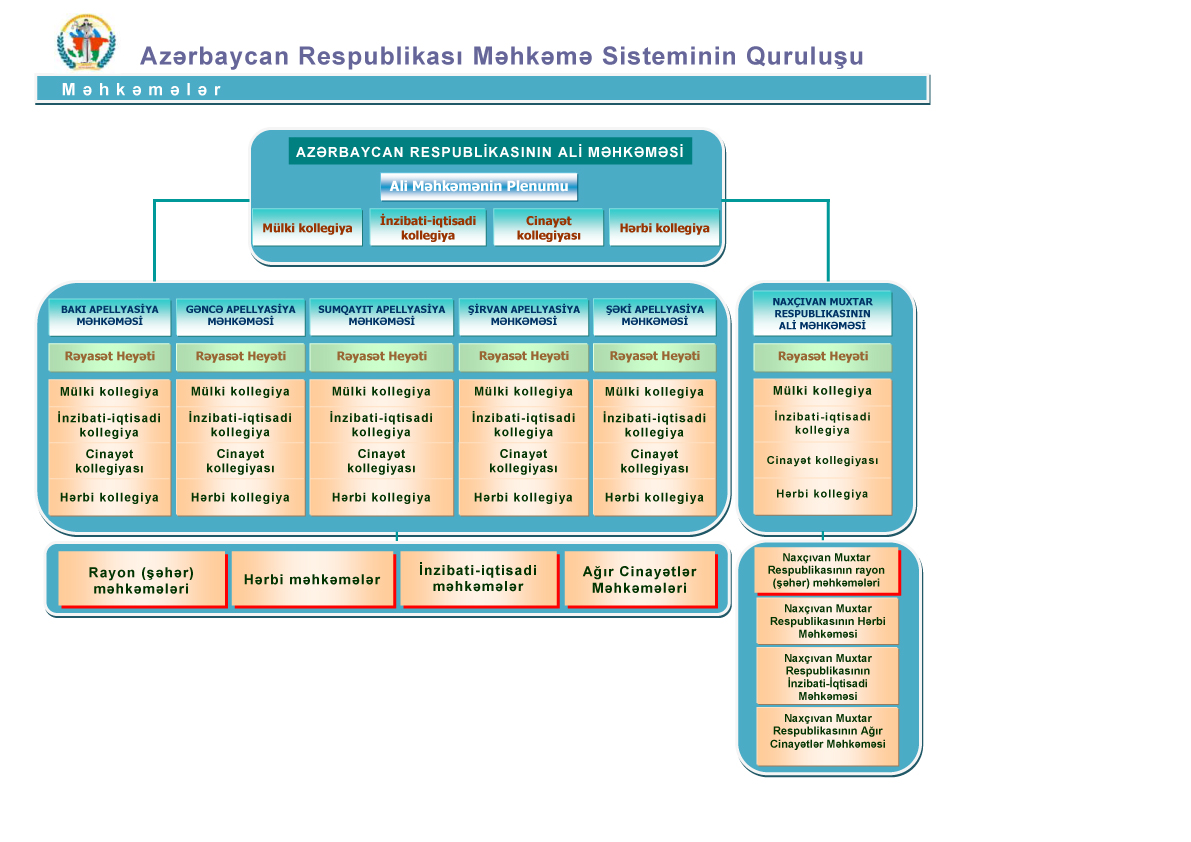
In accordance with the new judicial system, courts of Appeal operate in 6 regions of the country. The courts of Appeal consist of 4 boards — civil, criminal, military, and administrative-economic boards and operate under the relevant territorial jurisdiction. In the organization of the courts of Nakhchivan AR included in the judicial system of the Republic of Azerbaijan, it was taken into account that the autonomous republic is located outside the main territory of the country and is kept under blockade by the aggressive Republic of Armenia. The Supreme Court of Nakhchivan AR is the appellate instance in relation to the courts of the autonomous republic. Decisions of the Supreme Court of Nakhchivan AR are considered by the Supreme Court of the Republic of Azerbaijan in the Cassation procedure.
There are 4 judicial boards — Civil, Criminal, Military, and Administrative-Economic boards within the Supreme Court of the Republic of Azerbaijan, which is the court of Cassation instance. The decisions of the appellate courts are considered by the Supreme Court in Cassation procedure.
The Constitutional Court of the Republic of Azerbaijan, being the supreme body of constitutional justice of the country, ensures the supremacy of the Constitution of Azerbaijan. At the same time, December 23 « on the Constitutional Court », adopted within the framework of the reforms carried out in our country. According to the law of 2003, the mechanism for exercising the right of citizens to appeal directly to the Constitutional Court in connection with the restoration of violated rights and Freedoms was established.
The relevant amendments to the law « on courts and judges » and the laws « on Judicial-Legal Council » adopted in the framework of measures to increase the efficiency of justice in the conditions of effective cooperation with the Council of Europe are of particular importance.
The immunities and terms of office of judges were revised by the new legislation, indefinite appointment of judges was determined, disciplinary responsibility issues were directly related to the competence of the Judicial — Legal Council, a new body was created for the selection of candidates for the positions of judges.
According to the new rules on Judge elections, for the first time in 2005, multi-stage procedures, test methods, as well as written and oral exams were held, long-term training courses were organized for candidates to judge, High Court judges, prominent scholars, persons with rich knowledge and experience, as well as experts from influential foreign countries, including Turkey, Council of Europe Commissioner for Human Rights, judges of the European Court of human rights, experts of the European Center for General Law and ABACEELI were involved in these courses.

